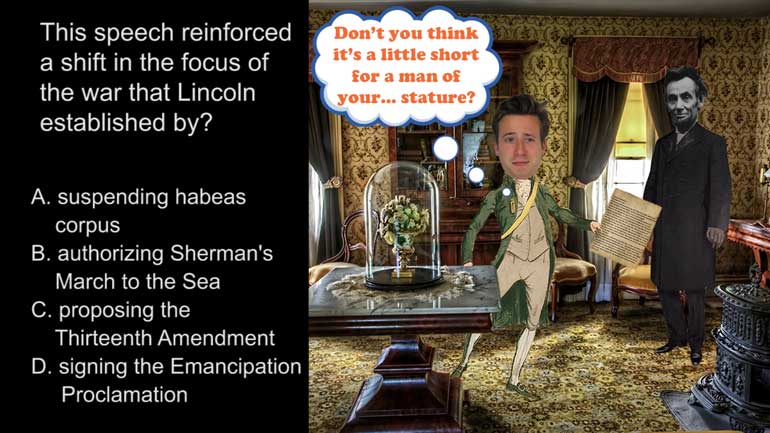ShmoopTube
Where Monty Python meets your 10th grade teacher.
Search Thousands of Shmoop Videos
AP Psychology 2.4 Biological Bases of Behavior 21 Views
Share It!
Description:
AP Psychology 2.4 Biological Bases of Behavior. A 3D X-ray of the brain that shows structure but not function is called what?
Transcript
- 00:04
And here's your shmoop du jour brought to you by 3d x-ray imaging [Person wearing 3d glasses in an x-ray machine]
- 00:07
complete and total transparency now in funky red and blue okay here's a
- 00:13
question a 3d x-ray of the brain that shows structure but not function is
- 00:18
called what and here are the potential answers..
- 00:22
...Okay so the key here is structure over function we're [A key and a brain appears]
Full Transcript
- 00:27
talking the structure of the brain not the activity within it think of it like
- 00:30
fashion over function this x-ray only cares about outer appearances which [Person photographing a woman on a catwalk]
- 00:35
sounds like a good reason to break up if you ask us all right now starting with A
- 00:39
we've got a PET scan or positron emission tomography scan which is a
- 00:45
nuclear imaging test that creates images of the functional processes of the body [Pet scan definition]
- 00:50
on a brain it'll look something like this...this scan is all about function
- 00:55
it's not in it for the fashion and remember fashion over function is what [Woman with a brain for a head being photographed on a catwalk]
- 01:00
we're looking for here so we can cross out A. What about B; fMRI or functional
- 01:05
magnetic resonance imaging bit of a spoiler in the title there huh? This
- 01:09
imaging procedure is definitely functional it measures brain activity by
- 01:13
way of detecting associated changes in blood flow how? Because blood flow to the [Brain and a blood drop on either side of a weighing scale]
- 01:18
brain and neuronal activation are linked where there's blood there's action and
- 01:23
no we're not talking about the latest transformers movie okay C doesn't work
- 01:27
either because an EEG or electroencephalogram is a test that
- 01:33
detects electrical activity in the brain via electrodes seeing is it's all about [A little girl with electrodes attached to her head]
- 01:38
all electrical activity it doesn't fit coincidentally that's the exact reason
- 01:42
it wasn't the title for the transformers new movie.. Well D isn't right
- 01:47
either because an EKG or electrocardiogram is focused on
- 01:52
electrical activity too but that's not the main reason it's wrong cardio means [Electrical pulses appear]
- 01:57
heart so you can guess that an electrocardiogram is performed on your
- 02:02
heart not your brain and wouldn't want to mix those two up leaving us with E..A
- 02:06
CT or computerized tomography scan compiles x-ray images of the brain into
- 02:12
a complete and structured image.. however the image doesn't change it's a [Man falls off a CT scan table]
- 02:16
passive 3d image of the brain that doesn't show it performing a function
- 02:18
and is often used to assess injury from trauma so it looks like E is our answer
- 02:23
and unfortunately it doesn't quite pick up emotional trauma caused by really bad [A woman giving her ex boyfriend items in a box]
- 02:27
breakup experiences, though scientists have hoped that one day a CT will pick up
- 02:32
the signs of empty ice cream cartons and quietly hummed Adele songs....[Doctors looking at a man in a CT scanner]
Up Next
AP U.S. History Exam 2.45. The journey shown on the map was an example of...what?
Related Videos
AP U.S. History Exam 2.26. This speech reinforced a shift in the focus of the war that Lincoln established by...what?
What did the Spanish messengers bring with them to North America? Hint: you probably wouldn't be thrilled to get this for your next birthday.
AP U.S. History Diagnostic 24. How did the United States choose containment over the National Security Council Report in Latin America?
AP U.S. History Exam 2.25. In writing the Gettysburg Address, Lincoln was still working to win over Northern voters who believed that...what?




